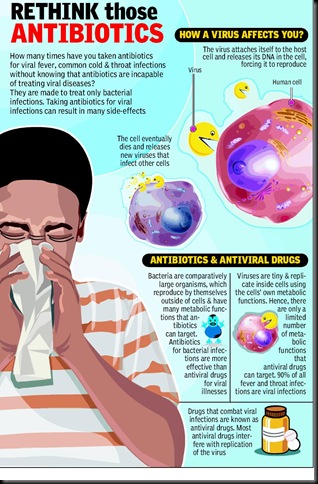The next time you are down with viral fever, don’t rely on antibiotics to get better. You might have come back with a prescription for antibiotics after the doctor diagnosed you with a viral infection but rest assured they will not cure you.
 Antibiotics are made specifically for the treatment of bacterial infections. Not only does taking antibiotics for a viral infection fail to cure it, the drug also ends up killing the harmless and protective bacteria in the body.
Antibiotics are made specifically for the treatment of bacterial infections. Not only does taking antibiotics for a viral infection fail to cure it, the drug also ends up killing the harmless and protective bacteria in the body.
Says Dr C M Gulathi, editor, Monthly Index of Medical Specialities: ‘‘Prescribing antibiotics for viral is wrong as it serves no purpose. In fact, it can lead to harmful side effects. Most kinds of fever and throat infections are results of viral infection.’’
Most doctors are under immense pressure from the patient to prescribe drugs as medicines usually give a sense of security to the patient, making them feel better instantly. Explaining why doctors prescribe antibiotics for viral infections, Gulathi adds: ‘‘Doctors know that patients are going to start distrusting them if they don’t prescribe medicines. Secondly, doctors don’t spend too much time making the diagnosis these days. Prescribing antibiotics for viral infection is an outcome of poor diagnosis. Thirdly, doctors are also under pressure from private pharmaceutical companies to boost their business by prescribing their drugs.’’
A virus is a small infectious agent that attaches itself to a living cell known as the host cell and starts reproducing. This leads to what we know as a viral infection. The virus attaches itself to the host cell and releases its DNA in the cell, forcing it to reproduce. The cell eventually dies as the virus prevents it from performing its normal functions. When it dies the cell releases new viruses that infect other cells. The most common viral infections are those of the nose, throat and the upper airways — in other words, upper respiratory infections. Sore throat, sinusitis, common cold and influenza are all caused by viruses.
Viral infections are usually diagnosed through the symptoms presented. Accurate diagnosis can become difficult sometimes, in which case blood tests and cultures might be needed. Drugs that combat viral infections are known as antiviral drugs. Most antiviral drugs interfere with replication of the virus. These drugs include interferons, immunoglobulins and vaccines. Interferons stop viral infections. Immunoglobulin have antibodies which fight infection.
There are ten times as many bacteria as human cells in our body. Most of these bacteria are harmless or protective to the immune system. Along with killing the pathogenic bacteria, which can cause infections, antibiotics can kill the bacteria needed by the body as well. It can also make the harmless bacteria immune to antibiotics.
Antibiotics are not effective against viral infections but if a person has a bacterial infection in addition to a viral infection, an antibiotic is often necessary.
Source:TOI
3 comments:
good artical i think that the graphics add to the material keep
posting more of such interesting articles.
thank you
Wow! what an idea ! What a concept ! Beautiful .. Amazing …
Post a Comment